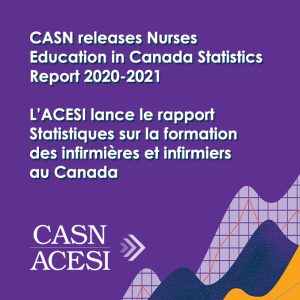 November 22, 2022 – Ottawa, Ontario – Canadian Association of Schools of Nursing (“CASN”) issued a statement today announcing its Registered Nurses Education in Canada Statistics, 2020–2021 — Registered Nurse Workforce, Canadian Production: Potential New Supply, (“report”).
November 22, 2022 – Ottawa, Ontario – Canadian Association of Schools of Nursing (“CASN”) issued a statement today announcing its Registered Nurses Education in Canada Statistics, 2020–2021 — Registered Nurse Workforce, Canadian Production: Potential New Supply, (“report”).
“CASN is pleased to present its annual statistics report to support health human resource planning in both the nursing service and nursing education sectors. It demonstrates the strong partnerships that exist among national and provincial and territorial bodies as well as effective collaborative relationships with multiple stakeholders,” said Cynthia Baker, Executive Director, CASN.
Highlights from the report include the following:
- 12,780 students graduated from entry-to-practice programs for registered nurses in 2021 (2,302 Quebec diploma and 10,478 baccalaureate) (graph, page 6), representing a continuous trend upward from the 4,833 who graduated in 2000.
- 16,626 students were admitted to entry-to-practice programs for registered nurses in 2020-2021 (3,749 Quebec diploma and 12,877 baccalaureate) (graph, page 5), 753 more admissions than in 2019-2020.
- Statistics Canada reports the number of vacancies for professional occupations in nursing (which includes “nursing coordinators and supervisors, registered nurses, registered psychiatric nurses, and graduate nurses”) in 2018-2019, prior to the COVID-19 pandemic, as 11,615 vacancies on average (Q4 2018-Q1 2020). From September 2020 to December 2021 (this survey’s data range) Statistics Canada reports, on average, 22,641 vacancies.
- There were 616 graduates from nurse practitioner programs in 2021 (graph, page 12).
- There were 772 admissions to nurse practitioner programs in 2020-2021 (graph, page 11).
- 4% of schools offered an accelerated baccalaureate program (table, page 13).
- In 2021, schools were unable to fill 52 full-time faculty positions. Schools projected a need to hire 543 full-time faculty (340 permanent positions, 103 contract positions) in 2022.
- 97 permanent faculty retired in 2021.
“Although Canada’s health care system is experiencing a critical nursing shortage, the annual survey report shows that schools of nursing graduating classes are among the highest ever recorded. The report also shows that the number of nursing faculty available to educate the next generation of nurses is shrinking due to retirements. While the health care system may need more registered nurses because the population is aging and because of Covid-19, retention of the nursing workforce appears to be the essential issue. Working conditions must be addressed to retain both new graduates and experienced nurses. Moreover, schools of nursing need support if they are to continue to grow,” said Cynthia Baker. “Governments must work with schools of nursing to invest strategically in quality nursing education through funding, resources, and support to ensure nursing graduates are clinically competent, emotionally resilient, and retainable.”
About Canadian Association of Schools of Nursing
The Canadian Association of Schools of Nursing (CASN) is the national voice for nursing education, research, and scholarship and represents baccalaureate and graduate nursing programs across Canada. CASN’s mission is to lead nursing education and nursing scholarship in the interest of healthier Canadians.
For more information:
Canadian Association of Schools of Nursing
Telephone: (613) 235-3150
Email: inquire@casn.ca
Website: www.casn.ca


